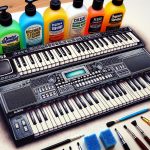In the digital age, learning to play the keyboard has never been easier, thanks to a plethora of iPad apps designed to make the journey both fun and effective. Whether you're a complete beginner or looking to brush up on your skills, there's an app out there tailored to your needs.
From interactive lessons that feel like games to comprehensive courses taught by seasoned musicians, these apps transform your iPad into a portable music teacher. Let's dive into the world of iPad apps that are striking the right chords with keyboard learners of all ages.
Benefits of Learning Keyboard with iPad Apps
Learning the keyboard has never been more engaging or accessible, thanks in large part to the plethora of iPad apps designed for aspiring musicians. These innovative applications achieve a delightful harmony of convenience and efficacy, offering myriad benefits to users of all ages and skill levels.
Personalized Learning Pace is one of the standout advantages. Traditional music lessons often proceed at the instructor's pace, which might not align with every student’s needs. iPad apps, however, allow users to progress at their own pace, replaying difficult sections as needed and skipping over concepts they've already mastered. This custom approach ensures that learners remain neither bored nor overwhelmed.
Affordability is another significant benefit. Registering for music classes or hiring a private tutor can be expensive. iPad apps, on the other hand, often come at a fraction of the cost, with many offering free basic courses. Even premium versions or subscriptions are typically less costly than traditional lessons, making keyboard learning more accessible to a wider audience.
The Availability of Diverse Teaching Methods caters to different learning preferences. Some apps focus on a game-like interface to make learning feel more like play, which can be especially appealing to younger users. Others provide video tutorials, interactive sheet music, or hands-on practice exercises. This variety ensures that every learner can find an app that resonates with their preferred style of learning.
Real-Time Feedback and Progress Tracking are also made possible through advanced technology in iPad apps. Sensors and microphones can assess the user's playing in real-time, offering immediate feedback on timing, accuracy, and rhythm. Such instant evaluations can be incredibly motivating, as they allow learners to recognize and celebrate their improvements and milestones.
Moreover, these apps often come with a Vast Library of Songs spanning various genres and difficulty levels. Learners can start with simple tunes and gradually move to more complex pieces, keeping the learning process fresh and exciting. This extensive repertoire also enables users to practice playing the songs they love, which can significantly enhance motivation and enjoyment.
In addition to these benefits, iPad keyboard learning apps foster a sense of Community and Support. Many apps offer online forums or integration with social media, allowing learners to share their progress, ask for advice, and connect with others on the same musical journey. This sense of community can be a strong motivating factor, encouraging continuous learning and improvement.
Top Interactive Keyboard Learning Apps

Delving into the realm of digital keyboard learning, a few iPad apps have risen above the rest, setting benchmarks for interactive and engaging piano education. These apps not only offer personalized lessons but also incorporate elements that make learning feel like a game, thus maintaining the learner's interest and motivation.
Simply Piano is a household name for anyone looking to dive into keyboard learning through their iPad. This app is celebrated for its user-friendly interface and its ability to cater to both beginners and advanced players. It listens to the player through the iPad's microphone, providing real-time feedback that helps in correcting mistakes instantly. With a vast library that spans classical to contemporary hits, Simply Piano ensures that learners have a wide range of songs to choose from.
Another standout is Yousician, which prides itself on its technology that recognizes music played on an acoustic keyboard, or through a midi connection, and provides instant feedback and guidance. What sets Yousician apart is its self-paced learning approach, allowing users to progress at their own speed, making it an excellent choice for learners of all ages.
Flowkey is renowned for its flexibility, offering courses and songs across various genres and difficulty levels. Its key feature is the split-screen view, allowing learners to see both hand movements and sheet music in real-time, facilitating a more comprehensive learning experience. Flowkey's extensive song library is continually updated, ensuring that users always have fresh and motivating songs to practice.
For those interested in a more social learning experience, Skoove offers an engaging platform with interactive piano lessons. Skoove’s AI recognizes the notes you play and helps guide your progression. It also offers the opportunity to receive lessons from real instructors, which adds a personal touch to the digital learning process.
| App | Key Features | Best For |
|---|---|---|
| Simply Piano | Real-time feedback, Wide song library | Beginners to Advanced |
| Yousician | Self-paced learning, Instant feedback | Learners of all ages |
| Flowkey | Split-screen view, Comprehensive song library | Flexible learning |
| Skoove | AI recognition, Access to real instructors | Community-centered learning |
Courses by Seasoned Musicians

A unique selling point of some iPad apps for learning the keyboard is their partnership with seasoned musicians and educators. These collaborations result in courses that not only cover the technical aspects of playing the piano but also bring a rich, immersive learning experience to the table. Apps that feature lessons crafted by expert musicians often stand out for their depth of knowledge, insightful tips, and the real-world experience they impart to learners.
Among the notable apps that boast such courses, a few stand out for their direct connection to the industry. For instance, Simply Piano and Flowkey collaborate with professional pianists and composers to create specialized lessons that cater to a variety of musical tastes and skill levels. These lessons aren't just about hitting the right notes; they also focus on the artistry and expression behind the music. As a result, learners get a holistic education that's as much about performance as it is about technique.
Yousician, on the other hand, employs a team of music educators led by high-profile musicians. This app takes an innovative approach by integrating technology with traditional teaching methods. The feedback mechanism, powered by the app's advanced algorithm, simulates a real-time classroom experience. This gives students the feeling of having a personal tutor without the need for physical presence.
Skoove offers something slightly different; it leans heavily on its AI recognition software to provide real-time feedback, but it doesn't stop there. The app ensures that its course content is continually updated and vetted by professional musicians and teachers. This collaboration ensures that learners are not only getting the most current information and techniques but are also exposed to various teaching styles and perspectives.
Song Library and Genre Diversity
An attractive feature for many learners is the diversity of songs available in these apps' libraries. Simply Piano boasts a vast library that spans numerous genres, allowing students to practice with songs they love and are familiar with. Yousician and Flowkey equally offer a wide array of options, from classic compositions to modern-day hits, appealing to users' varied musical tastes.
Fun and Gamified Learning Experience

In today's digital age, learning to play the keyboard needn't be a monotonous task, thanks to a handful of iPad apps that have revolutionized the method of musical education by incorporating fun and games into the curriculum. These apps, specifically designed for learners of all ages, turn the potentially daunting journey of keyboard mastery into an interactive and enjoyable adventure.
Simply Piano and Yousician, for instance, lead the charge in gamified learning. They boast features that engage users in a way that feels more like playing a video game than sitting through a traditional music lesson. Progressing through levels, unlocking achievements, and competing with friends or users worldwide provide constant motivation and an element of excitement that traditional learning methods often lack.
Simply Piano uses an innovative approach by listening to the notes you play and providing real-time feedback, almost like having a personal tutor at your side. This instant feedback mechanism helps learners to correct their mistakes on the fly and understand music theory in a practical context. Meanwhile, Yousician crafts a personalized journey for each user, leveraging well-known songs and exercises designed to improve specific skills, such as reading sheet music and playing by ear.
Flowkey and Skoove further enhance the learning experience with their unique features. Flowkey offers a split-screen view where one side shows a video of a pianist playing the song, and the other displays the falling notes, akin to popular rhythm games. This visual representation aids in understanding hand coordination and timing, crucial skills for any pianist. On the other hand, Skoove emphasizes the importance of improvisation and composition, encouraging learners to create their music. This creative freedom not only makes learning more enjoyable but also nurtures an in-depth understanding of musical structures and harmony.
The diverse song libraries that these apps offer are nothing short of impressive. Ranging from classical to contemporary hits, these libraries ensure that learners can practice and play songs they love, making practice sessions something to look forward to. Moreover, these apps often update their song selections to keep content fresh and engaging.
Furthermore, the aspect of social learning cannot be overstated. Many of these apps feature online communities where learners can share their progress, challenges, and achievements. This not only fosters a sense of belonging and encouragement but also offers a platform for receiving constructive feedback from peers and instructors.
Conclusion
With the right app, learning to play the keyboard becomes an adventure rather than a chore. The apps we've explored offer more than just lessons; they're gateways to a musical journey tailored specifically for you. Whether you're drawn to the classics or prefer to rock out to contemporary hits, there's something for everyone. The community aspect can't be overlooked either—it's like having a cheer squad and a team of mentors rolled into one. So grab your iPad, pick an app, and start playing. Who knows where your musical journey will take you?
Harlan Kilstein began playing piano during covid with no piano background at all. He taught himself how to play learning what to do and what not to do.
Today he's an advanced intermediate player and can help you grow in your skills because he learned all this on his own.








